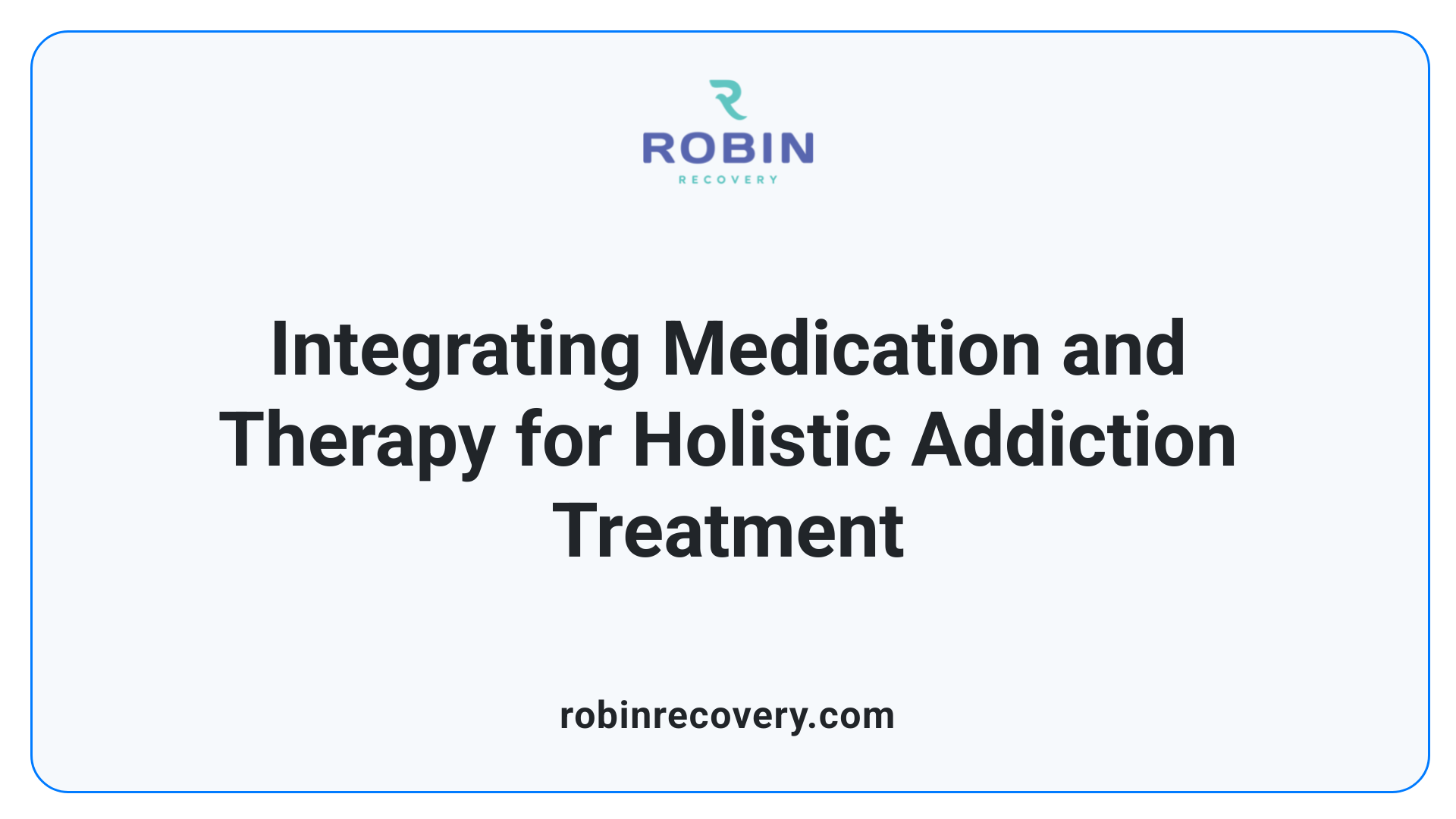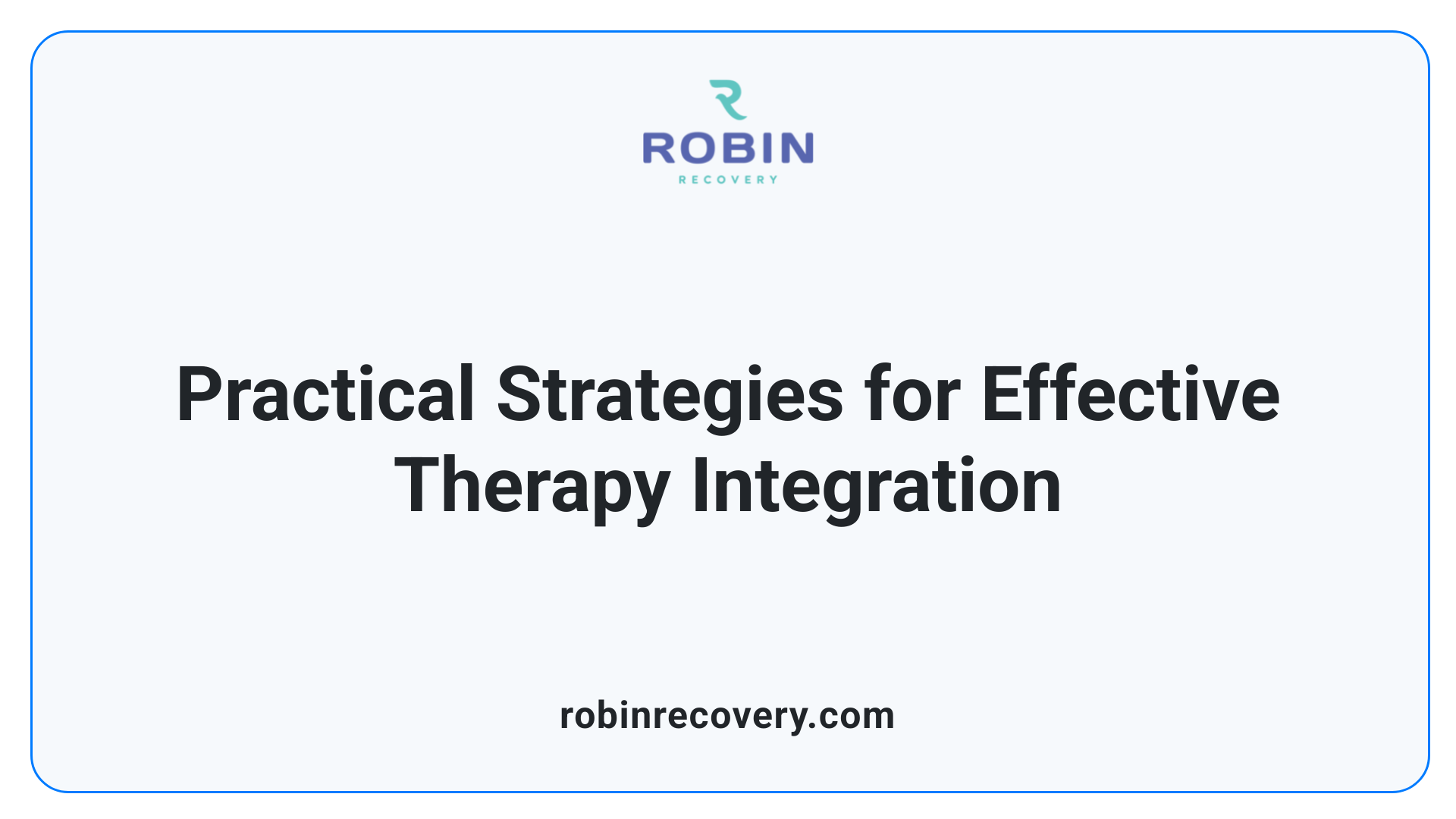The Benefits of Combining Medication and Therapy in Substance Use Treatment

Introduction
In the realm of substance use treatment, the integration of medication and therapy emerges as a pivotal advancement in achieving successful recovery. This combined approach not only enhances the effectiveness of treatment but also addresses the multifaceted nature of addiction, offering a more comprehensive path to recovery. Through a detailed exploration of scientific evidence, expert opinions, and practical applications, we delve into the transformative impact of integrating these treatment modalities.
The Whole-Patient Approach: A Comprehensive Treatment Strategy

Explanation of the 'whole-patient' approach
The 'whole-patient' approach to treating substance use disorders emphasizes integrating both medication and therapy. This strategy addresses not only the chemical dependency but also the emotional and psychological issues related to addiction. Medications help manage withdrawal symptoms and cravings, while therapy targets the behavioral patterns and thought processes contributing to substance use.
Benefits of combining medication and therapy
The efficacy of combining medication and therapy is well-documented. Research shows that such integration leads to faster and more significant improvements in recovery outcomes. For individuals experiencing depression alongside substance use, a meta-analysis revealed that combining psychotherapy and pharmacotherapy leads to notably enhanced well-being and lower relapse rates.
Comparison to standalone treatment methods
Standalone treatment methods, whether therapy alone or medication alone, have their strengths. However, when used in isolation, these treatments do not effectively address all facets of addiction. For example, while medication can stabilize neurochemical imbalances, it often fails to tackle the psychological triggers of substance use that therapy can address. In many cases, patients on combined treatment show 25% higher chances of positive long-term results compared to those receiving medication or therapy solely.
Impact on patient recovery rates
Overall, the combination of medication and therapy significantly boosts recovery rates. Studies indicate that comprehensive treatment plans yield higher abstinence rates and improved quality of life. Patients reporting improved functioning and coping mechanisms demonstrate the success of a holistic approach, illustrating that addressing both physical and mental health leads to more effective recovery strategies.
Synergistic Effects of Medication and Behavioral Therapies

Scientific Evidence Supporting Combined Treatment
Research shows that combining medication with behavioral therapy significantly enhances treatment efficacy for substance use disorders. Studies indicate that patients receiving combination therapy have better short-term and long-term recovery rates compared to those using either treatment type alone. This approach often results in a 25% reduction in rates of relapse.
Specific Benefits Related to Substance Use Disorders
Individuals undergoing comprehensive treatment that includes both medication-assisted treatment (MAT) and therapy experience improved coping skills. These patients often report higher levels of sobriety and a notable decrease in drug use and cravings, addressing both the physical and psychological aspects of addiction.
Improved Patient Retention and Employment Outcomes
Patients who utilize both medication and therapy demonstrate better treatment retention. This increased stability contributes to enhanced employment outcomes, enabling individuals to regain consistent work, thus fostering a sense of productivity in recovery.
Reduction in Relapse Potential and Health Risks
Moreover, integrated treatment significantly lowers the risk of relapse and associated health complications. By addressing underlying mental health issues alongside addiction, individuals reduce their chances of experiencing HIV, hepatitis C, and other related conditions, leading to better overall health outcomes.
Addressing Co-Occurring Disorders and Enhancing Emotional Health

What are the advantages of integrating medication with therapy for mental health treatment?
Integrating medication with therapy for mental health treatment provides several advantages. Medication can effectively manage symptoms such as depression, anxiety, and agitation, allowing individuals to engage more fully in therapy. This symptom management helps patients address deeper core issues, as the intensity of their symptoms is reduced.
Therapy enhances self-awareness and supports individuals in navigating life's complexities, while medication offers essential chemical support for the nervous system. Together, this integrated approach can lead to improved life quality, a greater sense of agency, and the potential for new choices and experiences.
Role of therapy in managing co-occurring mental health disorders
Therapy is crucial in addressing co-occurring mental health disorders, which often accompany addiction. Individuals grappling with both conditions can benefit from therapy's focus on emotional health, providing coping mechanisms to manage triggers that may lead to relapse. Evidence-based approaches, such as cognitive-behavioral therapy (CBT), help clients unravel negative thought patterns and develop healthier strategies for confronting challenges.
Importance of medication in stabilizing mental health conditions
While therapy tackles the emotional and behavioral aspects, medication stabilizes mental health conditions, particularly in cases of depression and anxiety. Medication can alleviate immediate symptoms, creating a foundation upon which individuals can build therapeutic momentum. This stabilization often leads to enhanced engagement in therapy and increased overall treatment effectiveness.
Impact on emotional and behavioral health improvements
The combination of therapy and medication has been shown to improve emotional and behavioral health significantly. Studies indicate that patients receiving combined treatment demonstrate better recovery outcomes, including higher rates of sobriety and reduced relapse. This integrative approach enables individuals to manage their conditions more effectively, fostering resilience and promoting enduring changes.
Mechanisms and Practical Steps in Combining Therapies

Practical Examples of Combined Modalities
Combining therapy with medication-assisted treatment (MAT) is increasingly effective in addressing substance use disorders. For example, methadone or buprenorphine helps manage withdrawal symptoms while counseling sessions focus on behavioral changes.
Cognitive-behavioral therapy (CBT) can be paired with antidepressants, significantly improving recovery odds. This integration allows patients to tackle both physiological and psychological hurdles simultaneously, enhancing long-term outcomes.
Success Stories and Expert Insights
Many individuals have successfully managed their substance use through this combined approach. Experts indicate that integrating MAT with therapies like motivational interviewing fosters better engagement, decreasing relapse rates. There are numerous testimonials from patients who report improved quality of life and sustained sobriety.
Guidelines for Tailored Treatment Plans
Creating personalized treatment plans is crucial. Factors such as the individual's history, underlying mental health issues, and specific substance dependencies should be evaluated. Regular assessments ensure that the combination of medication and therapy remains effective and aligned with the patient’s evolving needs.
Addressing Misconceptions About Medication-Assisted Treatment
Despite its benefits, MAT is often misunderstood. Many believe it merely substitutes one addiction for another. However, evidence shows that individuals on MAT can achieve lasting recovery when combined with proper psychological support. Community education is vital in dispelling these misconceptions.
Future Directions and Best Practices in Addiction Treatment

Research trends on integrated treatment approaches
The future of addiction treatment is increasingly leaning towards integrated approaches that combine medication and therapy. Research highlights that a holistic strategy can significantly enhance treatment outcomes by addressing both the physical and psychological facets of substance use disorders. Evidence-based practices like Medication-Assisted Treatment (MAT), combined with therapies such as Cognitive Behavioral Therapy (CBT) and motivational interviewing, are leading this integration.
Evidence-based practices and their development
Studies reveal that utilizing combinations of medication and therapy not only improves recovery rates but also decreases the likelihood of relapse. The behavioral components of these treatments help individuals modify their habits and enhance motivation. Ongoing research aims to refine these methods, ensuring they adapt to evolving understandings of addiction and mental health.
Long-term impact on recovery and relapses
Integrating treatment plans offers better long-term recovery outcomes. Combining therapy with medication leads to sustained engagement in treatment and aids in managing co-occurring disorders, which can exacerbate substance use issues. The ultimate goal is to minimize relapse rates and support individuals in resuming fulfilling lives.
Global implications for addiction treatment
As addiction becomes a global health issue, adopting integrated treatment approaches worldwide is vital. Countries that adopt evidence-based, holistic strategies show improved outcomes, emphasizing the importance of flexibility in treatment to cater to diverse populations. Tailoring therapy frequency and medication types to individual needs is crucial for effective recovery.
Conclusion
The integration of medication and therapy is more than a concurrent treatment plan—it's a revolution in addressing substance use disorders. This approach ensures that both the physical and psychological facets of addiction are addressed simultaneously, painting a more holistic picture of recovery. With scientific research and statistical evidence substantiating its effectiveness, this dual-pronged path offers hope and tangible results to those battling substance use disorders. As addiction treatment evolves, embracing combined therapies will not only enhance treatment outcomes but also set a new standard for comprehensive care.
References
- National Helpline for Mental Health, Drug, Alcohol Issues - SAMHSA
- Medications for Substance Use Disorders - SAMHSA
- Benefits of Combining Medications and Therapy - Highland Hospital
- Integrating psychotherapy and pharmacotherapy to improve drug ...
- Combining Drug Therapy and Psychotherapy for Depression
- How Do I Choose Between Medication and Therapy?
- Treatment and Recovery | National Institute on Drug Abuse (NIDA)
- Combined drug and psychological therapies may be most effective ...
- A Combination of MAT and Behavioral Therapy - Cedar Recovery
- Therapy For Substance Abuse Treatment
